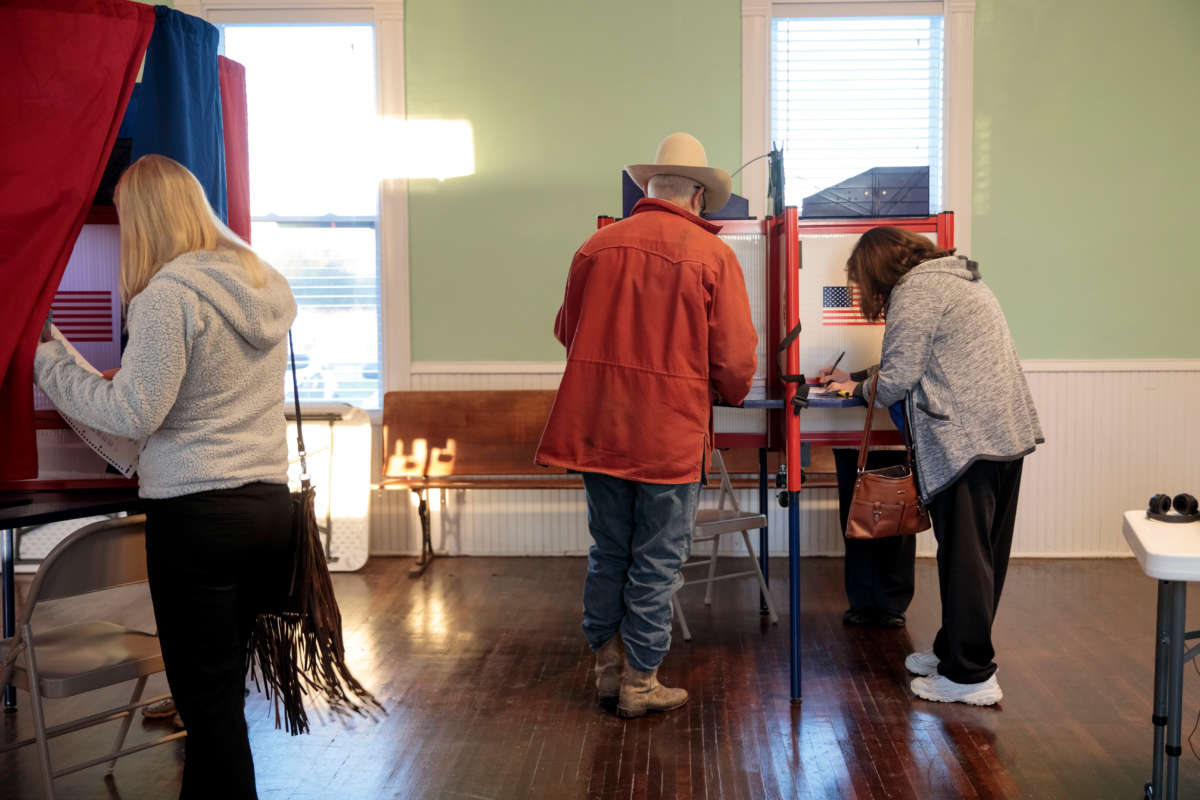Truthout is a vital news source and a living history of political struggle. If you think our work is valuable, support us with a donation of any size.
A referendum on the Kansas Constitution, which could alter the document to assert that it does not guarantee the right to abortion, is set to occur during the August 2 primary elections in the state — a date that some contend was selected by Republicans on purpose, as left-leaning or moderate voters will be less likely to vote in the primaries.
Kansas will be the first state to vote on the issue of abortion since the U.S. Supreme Court overturned the landmark 1973 Roe v. Wade ruling last month, undoing 50 years of abortion rights protections. In their ruling, the far right justices of the High Court determined that the matter should be decided upon by the states, even though abortion is a globally recognized fundamental human right.
During Kansas’s primary elections next month, voters will decide whether or not they agree with a 2019 decision from the Kansas Supreme Court, which ruled that the state constitution recognized a person’s right to personal autonomy, including reproductive and abortion rights.
Republican lawmakers’ amendment proposal states that the document does not actually recognize such rights. A “yes” vote on the amendment means the person casting their ballot agrees with that assertion — and believes that the constitution should be changed — while a “no” vote means a person believes that abortion rights should still be included.
The timing of the election is important, however, as it could curtail participation in the vote on the provision.
Voters have until July 12 to register for the primary election, but since the races are partisan, unaffiliated voters — including moderates who may oppose a future outright ban on abortion — may feel less inclined to take part in the election due to it having no other questions or candidates for them to vote on. But unaffiliated voters are still allowed to participate by obtaining a ballot that solely addresses the referendum question.
Additionally, those who are most likely to take part in the primary election are Republicans; because the current state governor is a Democrat, the governor’s race is not likely to draw in Democratic voters.
Orion de Nevers, an attorney at Campaign Legal Center, took note of these issues in an op-ed for Slate on Tuesday, calling the maneuvering of the referendum question away from the general election to the primary election date a blatant attempt to ensure only certain voters take part.
“The Republican legislature timed the abortion vote knowing that Kansas’ 2022 primary would be heavy on contested Republican races and light on Democratic ones,” de Nevers wrote. “It also knew that nearly 30 percent of Kansas voters are registered as ‘unaffiliated,’ and that those more moderate voters are unaccustomed to participating in primary elections because they cannot vote partisan ballots. So by scheduling the vote on abortion rights for the August primary, the Kansas legislature stacked the deck in favor of Republican turnout.”
If Republicans “had truly wanted to put the state’s abortion policy in ‘the people’s’ hands,” de Nevers added, they “would have scheduled the vote for the general election on Nov. 8.”
Abortion rights proponents have decried the proposed amendment, saying that it would allow the state legislature to pass any and all restrictions on abortion in the state.
The amendment “will mandate government control over our private medical decisions and pave the way for a total ban on abortion — with no exception for rape, incest or to save the mother’s life,” Ashley All, spokesperson for Kansans for Constitutional Freedom, said to PBS NewsHour.
According to a Kansas Speaks/Fort Hays State University poll published in February, 50.5 percent of residents don’t believe the state government should impose huge restrictions on people seeking abortion services, while just 25.4 percent say that state leaders should have the ability to do so. In another survey question, the poll asked whether pregnant people “are in a better position than politicians to make their own choices” on abortion. An overwhelming majority (62.5 percent) said they were, while just 14.2 percent disagreed.
Those numbers suggest that the Kansas Republicans’ attempts to amend the constitution may fail. But because the vote is taking place during a partisan primary election, rather than during the general election in November, it’s anyone’s guess what the outcome of the referendum question early next month will be.
A terrifying moment. We appeal for your support.
In the last weeks, we have witnessed an authoritarian assault on communities in Minnesota and across the nation.
The need for truthful, grassroots reporting is urgent at this cataclysmic historical moment. Yet, Trump-aligned billionaires and other allies have taken over many legacy media outlets — the culmination of a decades-long campaign to place control of the narrative into the hands of the political right.
We refuse to let Trump’s blatant propaganda machine go unchecked. Untethered to corporate ownership or advertisers, Truthout remains fearless in our reporting and our determination to use journalism as a tool for justice.
But we need your help just to fund our basic expenses. Over 80 percent of Truthout’s funding comes from small individual donations from our community of readers, and over a third of our total budget is supported by recurring monthly donors.
Truthout has launched a fundraiser, and we have a goal to add 182 new monthly donors in the next 24 hours. Whether you can make a small monthly donation or a larger one-time gift, Truthout only works with your support.
